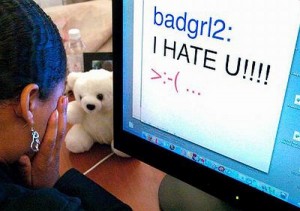
 Do you think a cyberbully is a terrible person whose sole goal in life is to make others miserable? If only it were so cut and dry.
Do you think a cyberbully is a terrible person whose sole goal in life is to make others miserable? If only it were so cut and dry.
Actually, there are lots of ways to bully someone online, and plenty of “good” kids exhibit cyberbullying behavior from time to time without realizing what they're really doing. Some studies on cyberbullying report that as many as 1 in 5 of their respondents admit to some form of cyberbullying
Does your child know that the following behaviors all qualify as cyberbullying
Spreading rumors about someone online
-
Directing derogatory language or slurs at someone
Flooding someone's inbox with unkind emails or texts
Threatening someone, even if you don't really mean it
-
Trash talking a fellow online gamer
Forwarding (or creating) embarrassing pictures of someone else
-
Voting in an online poll intended to bash or rate others
-
Posing as someone else and posting as if it were them
-
Creating profiles in someone else's name
-
Signing someone up for something without their permission (junk mail, porn, etc)
-
Accessing someone else's account without permission
-
Changing someone else's password without their knowledge
-
Posting someone's identifying information or sharing their secrets online
-
Starting or contributing to a web site, Facebook group, or message board thread dedicated to making fun of another person or group
-
Even sarcasm (which is often misread online) can be perceived as cyberbullying
 Kids often dismiss some kinds of cyberbullying as “no big deal” or insist that the recipient knows they “don't mean it.” But a thoughtless word or action online can be cyberbullying, and it can be devastating to the person on the other end.
Kids often dismiss some kinds of cyberbullying as “no big deal” or insist that the recipient knows they “don't mean it.” But a thoughtless word or action online can be cyberbullying, and it can be devastating to the person on the other end.
Parental monitoring is important, and not just because we want to protect our kids from cyberbullies. We also need to protect our kids from bullying others without realizing it – and that starts with knowing what they're doing and saying online.



